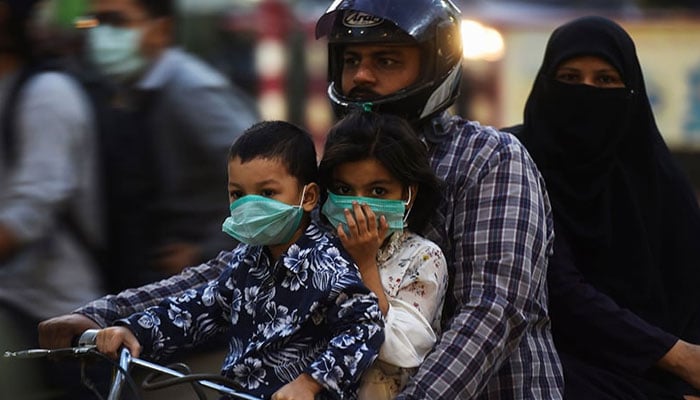No imminent threat of resurgence of Covid-19: NEOC
ISLAMABAD: Despite the emergence of a fresh wave of Covid-19 in neighbouring countries China and India, Pakistan’s health authorities rule out any imminent resurgence threat saying over 90 per cent population is vaccinated and a surveillance mechanism is in place at airports and other entry points.
The special session of the National Emergency Operations Centre (NEOC) was summoned and presided over by NDMA Lt. General Inam Haider Malik to discuss the possibility of Covid-19 resurgence following the detection of BF.7, a sub-variant of Covid-19, which has affected China and India.
Briefing the session, National Institute of Health (NIH) authorities said over 90 per cent of the local population is inoculated against Covid-19 with a mix and match of western, Chinese and Russian vaccines. However, authorities are continuously monitoring the situation and preparing for any eventuality.
They said the emergence of sub-variants of the Omicron variant is a routine phenomenon and more such variants and sub-variants would continue to emerge as viruses continue to evolve for their survival, adding that some wavelets could be possible due to evolving viruses and variants. Genome sequencing facilities are now available at dozens of research and diagnostic labs across the country.
Besides, a comprehensive system of surveillance is in place to detect any new variant or sub-variant of the Covid-19 virus at international airports and other entry points of the country, said an expert associated with NIH Islamabad, adding that major hospitals in the country were also ready to deal with any resurge in Covid-19 cases.
Chairman NDMA directed the federal and provincial authorities to ensure the availability of treatment facilities at intensive care units (ICUs) and high dependency units (HDUs) at healthcare facilities across the country. He also instructed the National Command and Operation Center (NCOC) at NIH to issue advisory and guidelines to deal with any emergency.
Explaining herd immunity, an NIH official said an entire community becomes immune to infectious disease when over 70 to 80 per cent population develops immunity through vaccination or by contracting the disease. There is no likelihood of the spread of disease from person to person after herd immunity is achieved. After herd immunity, the whole community becomes protected not just those who are immune. Pakistan has technically attained herd immunity as over 90 per cent of its population is vaccinated with different western, Chinese and Russian vaccines up to the age of 12 years. Besides, the majority of the Pakistani population had also developed natural immunity after being infected with the Coronavirus once or more during the last years, the NIH official said.
Director of the International Center for Chemical and Biological Sciences (ICCBS), Karachi, Dr Iqbal Chaudhry said that both Pakistan and India were unlikely to be affected much due to the emergence of BF.7 and other sub-variants as both the countries had achieved herd immunity through vaccination and infection with various variants of Covid-19. The case of China is different as it never allowed the development of immunity among its population. In addition, Chinese citizens are only vaccinated with their own vaccines, which prove less effective against emerging variants, he added.
-
 Jerome Tang Calls Out Team After Embarrassing Home Defeat
Jerome Tang Calls Out Team After Embarrassing Home Defeat -
 Cynthia Erivo Addresses Bizarre Rumour About Her Relationship With Ariana Grande
Cynthia Erivo Addresses Bizarre Rumour About Her Relationship With Ariana Grande -
 Prince Harry, Meghan Markle Spotted Cosying Up At NBA All-Star Game
Prince Harry, Meghan Markle Spotted Cosying Up At NBA All-Star Game -
 Lady Gaga Explains How Fibromyalgia Lets Her 'connect With People Who Have It'
Lady Gaga Explains How Fibromyalgia Lets Her 'connect With People Who Have It' -
 Metro Detroit Weather Forecast: Is The Polar Vortex Coming Back?
Metro Detroit Weather Forecast: Is The Polar Vortex Coming Back? -
 Daniel Radcliffe Reveals Surprising Way Fatherhood Changed Him
Daniel Radcliffe Reveals Surprising Way Fatherhood Changed Him -
 ‘Disgraced’ Andrew At Risk Of Breaking Point As Epstein Scandal Continues
‘Disgraced’ Andrew At Risk Of Breaking Point As Epstein Scandal Continues -
 Alan Cumming Shares Plans With 2026 Bafta Film Awards
Alan Cumming Shares Plans With 2026 Bafta Film Awards -
 OpenClaw Founder Peter Steinberger Hired By OpenAI As AI Agent Race Heats Up
OpenClaw Founder Peter Steinberger Hired By OpenAI As AI Agent Race Heats Up -
 Kate Middleton's Reaction To Harry Stepping Back From Royal Duties Laid Bare
Kate Middleton's Reaction To Harry Stepping Back From Royal Duties Laid Bare -
 Rose Byrne Continues Winning Streak After Golden Globe Awards Victory
Rose Byrne Continues Winning Streak After Golden Globe Awards Victory -
 Ice Hockey Olympics Update: Canada Stays Unbeaten With Dominant Win Over France
Ice Hockey Olympics Update: Canada Stays Unbeaten With Dominant Win Over France -
 Brooklyn Beckham Makes This Promise To Nicola Peltz Amid Family Feud
Brooklyn Beckham Makes This Promise To Nicola Peltz Amid Family Feud -
 Chinese New Year Explained: All You Need To Know About The Year Of The Horse
Chinese New Year Explained: All You Need To Know About The Year Of The Horse -
 Canadian Passport Holders Can Now Travel To China Visa-free: Here's How
Canadian Passport Holders Can Now Travel To China Visa-free: Here's How -
 Maya Hawke Marries Christian Lee Hutson In New York Ceremony
Maya Hawke Marries Christian Lee Hutson In New York Ceremony




